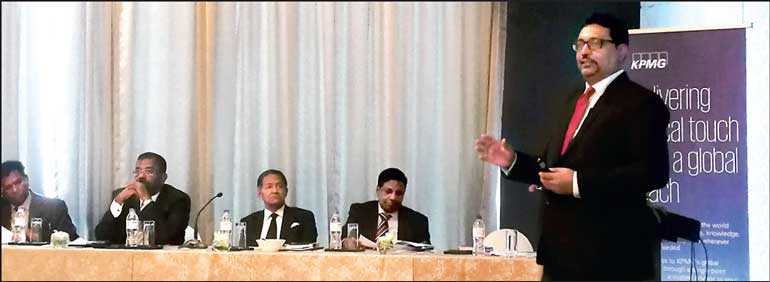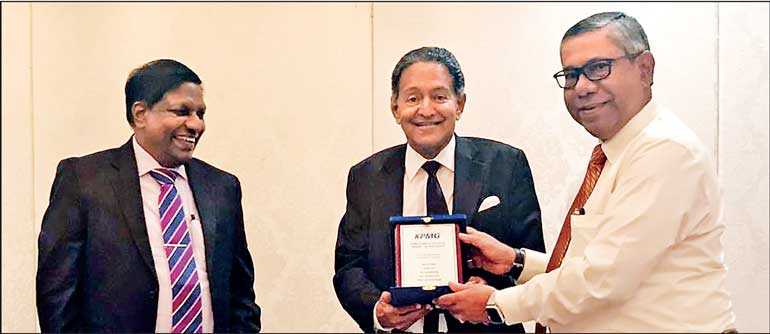Monday Feb 23, 2026
Monday Feb 23, 2026
Friday, 1 November 2019 00:00 - - {{hitsCtrl.values.hits}}



“Under the new Inland Revenue Act there is no requirement to furnish a bank guarantee upfront to the Tax Appeals Commission, and it is up to the Commission to decide if such security is required, this is a positive feature,” said Suresh Perera, delivering his presentation at the KPMG-organised presentation and panel discussion on tax and Customs appeals held on 18 October at Mövenpick Colombo.
Dr. K. Kanag-Isvaran, P.C, mentioned that the new law on bank guarantee will only apply to appeals after 1 April and the same has been upheld in a Court of Appeal judgement. He also spoke on the implications of resorting to an Administrative Review at the time of disputes. He stressed that the term “Review” connotes only an analysis of the legality of the issue and not the facts of the case.
M. Ravindrakumar presented in detail the finer points of appeals pertaining to customs issues. He further mentioned in his presentation that although in 2013, the Tax Appeals Commission Act was amended to allow appeals against the Director General of Customs, up to now, other than one case, no other case is filed at the Tax Appeals Commission. He also covered topics such as the current status of the Customs Act, Customs inquiry, further appeal, and revised Kyoto convention.
Suresh Perera during the presentation also pointed out that under some circumstances Assessments raised under the new Inland Revenue Act may reach the Court of Appeal stage within a period of mere six months, compared to the time taken under current procedure to pass stages of appealing to the Commissioner General of Inland Revenue (CGIR) and the Tax Appeals Commission. Under the old procedure, once an appeal is lodged against an Assessment raised under the old Inland Revenue Act, the CGIR has a period of 2 years to hear and determine an appeal. The Tax Appeals Commission has a period of 270 days from the commencement of hearing the case, whilst the time period to commence the hearing of an appeal lodged before the Tax Appeals Commission is not statutorily regulated. Under the new process, where the CGIR fails to determine a request lodged for an Administrative Review within a 3 month period, the taxpayer obtains the entitlement to proceed to the Tax Appeals Commission immediately after the expiry of the 3 month period. As per the new law where the Tax Appeals Commission fails to respond within a 3 month period to an appeal lodged to the Commission, the appellant may proceed directly to the Court of Appeal to seek justice. In an instance of this nature, even the questions of facts may come under the scrutiny of the Court of Appeal.
The process of appealing in relation to tax and customs was discussed in detail by the presenters.
The enlightening presentations were followed by a panel discussion with the eminent panellists Softlogic Holdings PLC Group FD Aashiq Lafir, Independent Director and Consultant Asoka Pieris, along with the presenters. Suresh Perera moderated the panel discussion
Asoka Pieris spoke of the efforts of the Chamber of Commerce to lobby the presidential candidates. Four main areas of concern were addressed, namely, minimisation of the number of taxes in Sri Lanka, reengineering of processes and digitalisation of Government institutions to improve overall efficiency and productivity, minimisation of the length of time taken to process cases in the Judiciary and lastly, introduction of technology to remove factual discrepancies. This would include the use of X-ray machines and digitising the Customs department.
Aashiq Lafir, in responding to a question on the quandaries faced by the commercial sector in regards to the Customs clearance process, spoke on the excessive time spent and monetary cost of appealing against decisions taken by those in Government institutions, more specifically, the Inland Revenue Department and the Customs Department. He stressed the need to appoint an independent body for inquiries into Customs disputes.
Dr. Kanag-Isvaran, P.C, stated that the primary issue is that a decision is not taken at any level. Each person to whom a query is raised simply ‘passes the ball’. He further mentioned that without a change in the culture and mindset of all those concerned, no amount of legal appointments or initiatives would be effective.
M. Ravindrakumar stressed the need to maintain transparency at the Customs Department. He stated that measures need to be taken to set up controls and monitor those employed at Customs.
Responding to a question raised by the moderator, on whether there is a reluctance on the part of the big corporates to settle disputes with the Inland Revenue Department, notwithstanding the inaccuracy of legal basis of raising assessments, Pieris pointed out that as per his experience in the boards of corporates he had served, there is no reluctance among corporates to assert and challenge the Inland Revenue Department when necessary under the appellate procedure, where a convincing case exists for the taxpayer. Adding to the sentiments, Lafir emphasised that the decision to pursue remedies under the appellate process is essentially a commercial decision based on cost-benefit analysis. In general where the tax in dispute is above Rs. 50 million, a corporate would pursue the matter under the appellate procedure.
The point that at the first stage of the resolution of disputes, both at the Department of Customs and the Inland Revenue Department, the judge, jury and the prosecutor is one and the same, was also discussed during the panel discussion with Dr. Kanag-Isvaran, P.C, expressing his point of view on the issue.
The moderator also raised a point as to the appropriateness and the fairness of the legal requirement to deposit 25% or 10% refundable or non-refundable deposit to seek justice before the Tax Appeals Commission, in the context that the Tax Appeals Commission is the first independent forum where the cause of the taxpayer or the importer is being canvassed. Does this connote justice would be available only to those who could afford it? The panellists expressed their views on this point.